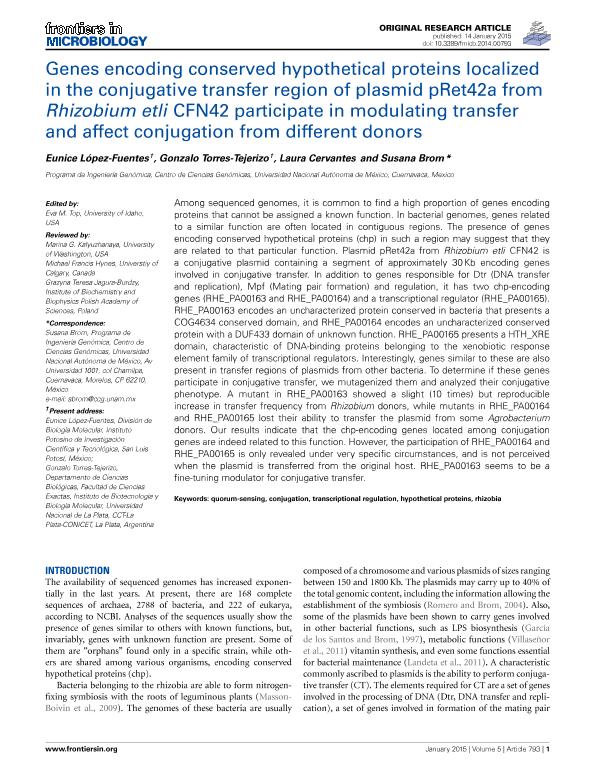Mostrar el registro sencillo del ítem
dc.contributor.author
López Fuentes, Eunice
dc.contributor.author
Torres Tejerizo, Gonzalo Arturo

dc.contributor.author
Cervantes, Laura
dc.contributor.author
Brom, Susana
dc.date.available
2018-06-08T18:51:46Z
dc.date.issued
2015-01
dc.identifier.citation
López Fuentes, Eunice; Torres Tejerizo, Gonzalo Arturo; Cervantes, Laura; Brom, Susana; Genes encoding conserved hypothetical proteins localized in the conjugative transfer region of plasmid pRet42a from Rhizobium etli CFN42 participate in modulating transfer and affect conjugation from different donors; Frontiers; Frontiers in Microbiology; 5; 1-2015; 1-10
dc.identifier.issn
1664-302X
dc.identifier.uri
http://hdl.handle.net/11336/47931
dc.description.abstract
Among sequenced genomes, it is common to find a high proportion of genes encoding proteins that cannot be assigned a known function. In bacterial genomes, genes related to a similar function are often located in contiguous regions. The presence of genes encoding conserved hypothetical proteins (chp) in such a region may suggest that they are related to that particular function. Plasmid pRet42a from Rhizobium etli CFN42 is a conjugative plasmid containing a segment of approximately 30 Kb encoding genes involved in conjugative transfer. In addition to genes responsible for Dtr (DNA transfer and replication), Mpf (Mating pair formation) and regulation, it has two chp-encoding genes (RHE_PA00163 and RHE_PA00164) and a transcriptional regulator (RHE_PA00165). RHE_PA00163 encodes an uncharacterized protein conserved in bacteria that presents a COG4634 conserved domain, and RHE_PA00164 encodes an uncharacterized conserved protein with a DUF433 domain of unknown function. RHE_PA00165 presents a HTH_XRE domain, characteristic of DNA-binding proteins belonging to the xenobiotic response element family of transcriptional regulators. Interestingly, genes similar to these are also present in transfer regions of plasmids from other bacteria. To determine if these genes participate in conjugative transfer, we mutagenized them and analyzed their conjugative phenotype. A mutant in RHE_PA00163 showed a slight (10 times) but reproducible increase in transfer frequency from Rhizobium donors, while mutants in RHE_PA00164 and RHE_PA00165 lost their ability to transfer the plasmid from some Agrobacterium donors. Our results indicate that the chp-encoding genes located among conjugation genes are indeed related to this function. However, the participation of RHE_PA00164 and RHE_PA00165 is only revealed under very specific circumstances, and is not perceived when the plasmid is transferred from the original host. RHE_PA00163 seems to be a fine-tuning modulator for conjugative transfer.
dc.format
application/pdf
dc.language.iso
eng
dc.publisher
Frontiers
dc.rights
info:eu-repo/semantics/openAccess
dc.rights.uri
https://creativecommons.org/licenses/by-nc-sa/2.5/ar/
dc.subject
Quorum-Sensing
dc.subject
Conjugation
dc.subject
Hypothetical Proteins
dc.subject
Rhizobia
dc.subject
Transcriptional Regulation
dc.subject.classification
Otras Ciencias Biológicas

dc.subject.classification
Ciencias Biológicas

dc.subject.classification
CIENCIAS NATURALES Y EXACTAS

dc.title
Genes encoding conserved hypothetical proteins localized in the conjugative transfer region of plasmid pRet42a from Rhizobium etli CFN42 participate in modulating transfer and affect conjugation from different donors
dc.type
info:eu-repo/semantics/article
dc.type
info:ar-repo/semantics/artículo
dc.type
info:eu-repo/semantics/publishedVersion
dc.date.updated
2018-06-08T14:25:39Z
dc.journal.volume
5
dc.journal.pagination
1-10
dc.journal.pais
Suiza

dc.description.fil
Fil: López Fuentes, Eunice. Universidad Nacional Autónoma de México; México
dc.description.fil
Fil: Torres Tejerizo, Gonzalo Arturo. Universidad Nacional Autónoma de México; México. Consejo Nacional de Investigaciones Científicas y Técnicas; Argentina
dc.description.fil
Fil: Cervantes, Laura. Universidad Nacional Autónoma de México; México
dc.description.fil
Fil: Brom, Susana. Universidad Nacional Autónoma de México; México
dc.journal.title
Frontiers in Microbiology
dc.relation.alternativeid
info:eu-repo/semantics/altIdentifier/doi/https://dx.doi.org/10.3389/fmicb.2014.00793
dc.relation.alternativeid
info:eu-repo/semantics/altIdentifier/url/https://www.frontiersin.org/articles/10.3389/fmicb.2014.00793/full
Archivos asociados
